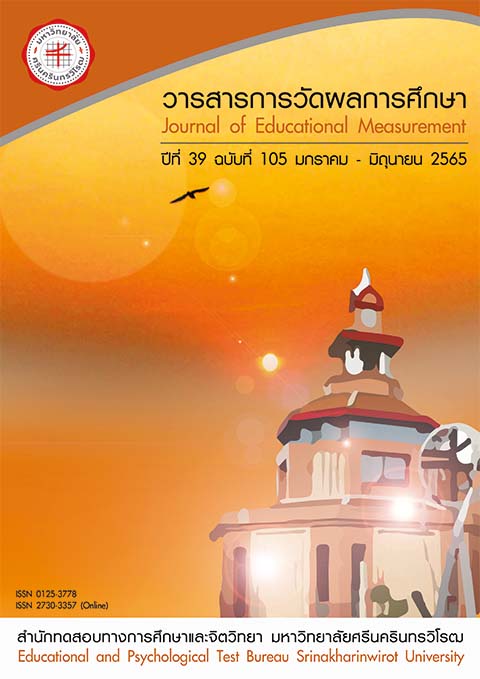การจัดการผลกระทบทางจิตใจของหญิงที่มีอาชีพขายบริการทางเพศ: การศึกษาเชิงปรากฎการณ์วิทยาแบบตีความ
คำสำคัญ:
การจัดการผลกระทบทางจิตใจ, ผู้หญิงที่มีอาชีพขายบริการทางเพศ, การวิเคราะห์เชิงปรากฎการณ์วิทยาแบบตีความ (IPA)บทคัดย่อ
บทความวิจัยนี้นำเสนอวิธีการจัดการผลกระทบทางจิตใจของผู้หญิงที่มีอาชีพขายบริการทางเพศที่ได้มาจากการวิจัยเชิงคุณภาพตามแนวทางการวิเคราะห์เชิงปรากฏการณ์วิทยาแบบตีความ (IPA) ข้อมูลวิจัยได้มาจากการสัมภาษณ์เชิงลึกกึ่งโครงสร้างกับผู้หญิงที่มีอาชีพขายบริการทางเพศจำนวน 4 คน บทความวิจัยนี้นำเสนอหนึ่งใจความสำคัญหลัก “การประกอบอาชีพขายบริการทางเพศเป็นความทุกข์ที่(ไม่)สามารถเยียวยา” ซึ่งประกอบไปด้วย 3 ใจความสำคัญย่อยคือ 1) แอลกอฮอล์คือตัวช่วยสำคัญ 2) ความหวังที่จะเติมเต็มความหวังคือแรงผลักดันสำคัญ และ 3) การเลิกอาชีพขายบริการทางเพศคือทางออกของความทุกข์ ผลการวิจัยดังกล่าวแสดงให้เห็นว่าผู้หญิงกลุ่มนี้จำเป็นจะต้องได้รับความใส่ใจเป็นพิเศษ บริการการปรึกษาเชิงจิตวิทยาและการให้ความช่วยเหลือด้านจิตใจทั้งจากภาครัฐและเอกชนจะต้องสามารถเข้าถึงได้อย่างทั่วถึงสำหรับผู้หญิงในกลุ่มอาชีพนี้ หัวใจสำคัญในการทำงานด้านจิตใจกับผู้หญิงกลุ่มนี้คือการให้เกียรติและการไม่ตีตราตัดสิน รวมถึงการเอื้อให้ผู้หญิงกลุ่มนี้ตระหนักถึงศักยภาพของตนเอง พัฒนาการนับถือตนเอง และค้นพบวิธีการในการจัดการกับปัญหาที่เกี่ยวเนื่องกับการตีตราและความไม่เท่าเทียมที่ส่งผลต่อคุณภาพชีวิตและสุขภาวะทางจิตของผู้หญิงที่มีอาชีพขายบริการทางเพศ
เอกสารอ้างอิง
จันธนา จันทร. (2560). ปัญหาสุขภาพจิตและปัจจัยที่เกี่ยวข้องในหญิงขายบริการที่มาขอรับความช่วยเหลือจากศูนย์ธารชีวิตพัทยา. ปริญญานิพนธ์การศึกษามหาบัณฑิต. กรุงเทพฯ: จุฬาลงกรณ์มหาวิทยาลัย.
ชมพูนุท ศรีจันทร์นิล. (2560). การวิเคราะห์เชิงปรากฏการณ์วิทยาแบบตีความ: ระเบียบวิธีวิจัยเชิงคุณภาพสำหรับการวิจัยทางด้านจิตวิทยา. วารสารศึกษาศาสตร์, 28(3), 1-13.
ชมพูนุท ศรีจันทร์นิล. (2562). การวิเคราะห์เชิงปรากฏการณ์วิทยาแบบตีความ: เกณฑ์ประเมินคุณภาพ. มนุษยศาสตร์สาร, 20(1), 1-25.
ทิพย์วิมล เดชภูมี และเกษราวัลณ์ นิลวรางกูร. (2555). คุณภาพชีวิตด้านสุขภาพของหญิงขายบริการทางเพศในจังหวัดแห่งหนึ่งของภาคตะวันออกเฉียงเหนือ. วารสารสมาคมพยาบาลฯ สาขาภาคตะวันออกเฉียงเหนือ, 30(3), 122-130.
Antebi-Gruszka, N., Spence, D., & Jendrzejewski, S. (2019). Guidelines for mental health practice with clients who engage in sex work. Sexual and Relationship Therapy, 34(3), 339-354.
Benoit, C., McCarthy, B., & Jansson, M. (2015). Stigma, sex work, and substance use: A comparative analysis. Sociology of Health & Illness, 37(3), 437-451.
El-Bassel, N., Schilling, R. F., Irwin, K. L., Faruque, S., Gilbert, L., Von Bargen, J., ... & Edlin, B. R. (1997). Sex trading and psychological distress among women recruited from the streets of Harlem. American Journal of Public Health, 87(1), 66-70.
Gilchrist, G., Gruer, L., & Atkinson, J. (2005). Comparison of drug use and psychiatric morbidity between prostitute and non-prostitute female drug users in Glasgow, Scotland. Addictive behaviors, 30(5), 1019-1023.
Israeli, A. L., & Santor, D. A. (2000). Reviewing effective components of feminist therapy. Counselling Psychology Quarterly, 13(3), 233-247.
Lancaster, K. E., MacLean, S. A., Lungu, T., Mmodzi, P., Hosseinipour, M. C., Hershow, R. B., ... & Go, V. F. (2018). Socioecological factors related to hazardous alcohol use among female sex workers in Lilongwe, Malawi: a mixed methods study. Substance use & misuse, 53(5), 782-791.
Miller, A.D. (2011). Leading sustainability in the anti-trafficking movement (Unpublished master’s thesis). WA: Northwest University.
Romans, S. E., Potter, K., Martin, J., & Herbison, P. (2001). The mental and physical health of female sex workers: a comparative study. Australian & New Zealand Journal of Psychiatry, 35(1), 75-80.
Smith, J. A., Flowers, P., & Larkin, M. (2009). Interpretative Phenomenological Analysis: Theory, method and research. London: Sage.
Smith, J. A. (2011). Evaluating the contribution of interpretative phenomenological analysis. Health psychology review, 5(1), 9-27.
Tamres, L. K., Janicki, D., & Helgeson, V. S. (2002). Sex differences in coping behavior: A meta-analytic review and an examination of relative coping. Personality and social psychology review, 6(1), 2-30.
Urada, L. A., Strathdee, S. A., Morisky, D. E., Schilling, R. F., Simbulan, N. P., Estacio Jr, L. R., & Raj, A. (2014). Sex work and its associations with alcohol and methamphetamine use among female bar and spa workers in the Philippines. Asia Pacific Journal of Public Health, 26(2), 138-146.
Velez, C., & Audet, C. (2019). Indoor Female Sex Workers’ Experiences of Counselling: A Hermeneutical Phenomenological Exploration. Canadian Journal of Counselling and Psychotherapy, 53(4), 330-359.
Wong, S. (2009). What are the mental health seeking behaviors of female sex workers? (Master’s thesis, Smith College, Northampton). Retrieved from https://core.ac.uk/download/pdf/231066592.pdf.



